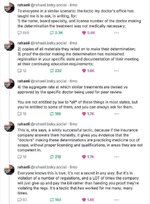https://finance.yahoo.com/news/mayo-clinics-latest-strong-quarter-172200236.html?fr=sycsrp_catchall
So after expenses, they only made about a measly half a billion. /s Poor Mayo Clinic. I had read about the nonprofit bullshit several years ago and just wanted to explain that nonprofits make plenty of money. Emory is another so called non profit. Anyway, this entire thread is all over the place, so I'd thought I join in.

Mayo Clinic's latest 'strong' quarter generated a historic $5 billion in net revenue
Jeff Kiger, Post-Bulletin, Rochester, Minn.
Updated 3 min read
Aug. 21—ROCHESTER — Mayo Clinic is continuing this year's "strong" financial results with a historic quarterly net revenue of $5 billion as its operating income climbed by 49%, to $449 million compared to $300 million for the second quarter of 2023.
Total revenue increased by 12%, to $5.01 billion, compared to $4.47 billion in 2023. Expenses also grew by 9.4%, to $4.56 billion for the quarter, which ended June 30.
I tried to post this earlier but couldn't.
And, btw, a lot of corporately owned practices also pay their doctors a salary, and so do many corporate hospitals, at least when it comes to those who work in the hospitals. I've read editorials written by doctors who are disgusted with our current system and who say they are ready for universal health care as they are very overworked in the current system.
I know that when I started working in home health, I worked for a government agency once in SC and once in NC. The work load was reasonable and the care was usually excellent. I was on the UR and QA committee. We didn't push unnecessary care to make money.
About 10 years later, just about all home health agencies became private corporations with profit motivation as the primary goal. The work load was insane and the nurses were expected to drive about 80 or 90 miles per day in addition to visiting a higher number of patients compared to my government jobs. I couldn't do it, so I ended up in QA when we moved to Florida.
I worked in QA for 2 different corporations and the quality of the work really suffered. We had a few good nurses who did a great job, but since at that time, the nurses were paid per visit, we had some nurses who did more than they were able to provide quality care. I remember one of the worst who always took on a large number of visits for the money. One time she did a digoxin level on a patient who was no longer taking that drug. Management didn't like me finding all of the mistakes, but that was my job. I recall over hearing the administrator once saying, "We must maximize profit." I've never worked for a nongovernmental nonprofit agency, so I can't compare it to the profit making ones, but I do know that home health care quality has gone down hill in recent years and there is a large shortage of nurses willing to do the type of work that I once considered my dream job.
This is one more reason why I support some type of publicly supported health care for all. And yes, premiums could be based on income. Part B Medicare already does that although there are only two different levels, unless that has changed. I'm not saying that all government care is excellent. I did some temporary work for a public health department that had poor quality of care, but sometimes it'a a matter of under funding or the person in charge is incompetent. What we have now is a nightmare. It's not going to change anytime soon, but perhaps one day our politicians will come to their senses and realize it's in everyone's best interest to provide care for all.
I know that many countries who have systems like Medicare for all are experiencing problems. I think the solution is to have reasonable copays, and premiums based on income. Plus we spend too much money on aggressive end of life care, which most people don't even want. For example, my mother in law was pushed into having dialysis by her doctor and my bro in law at age 86. She never wanted it and when she had stroke while nearly 90, they wanted her to continue. I talked them into letting her make her own decision. Since the stroke left her unable to speak, I suggested they ask her if she wanted to end dialysis and go on hospice. The way I put it is that she squeezed their hands very tightly when they asked if she wanted to go on hospice. Why not offer some help at home to older adults so they can avoid nursing homes and not receive expensive useless end of life care that does nothing but prolong suffering.


